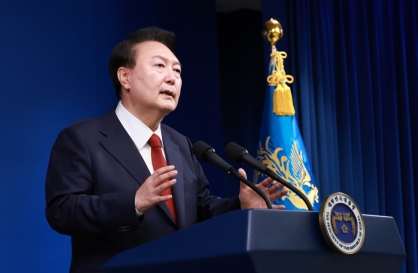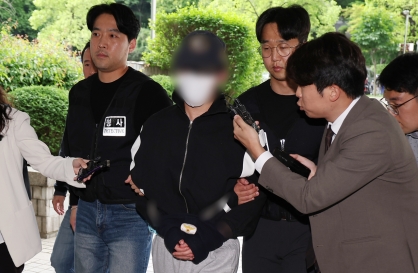Nominees running in the parliamentary elections start their formal campaigns when they register as candidates on Thursday or Friday. Their competition is set to heat up, with all pre-registration campaign restrictions lifted.
Surrounded by their campaign workers, candidates will crisscross districts, seeking to win voter support at subway stations, markets and other crowded places. Their campaign vehicles will roam the streets, with loudspeakers mounted on them blaring slogans and jingles.
But the hustle and bustle will not hide all the disgraceful behavior and scandals that have been associated with many of the nominations made by the ruling Saenuri Party and the main opposition Democratic United Party. Their screening committees ignored their preset criteria more often than not and picked applicants of questionable moral character and those whose images were tainted by corruption charges.
In addition, nominations were criticized for being biased in favor of those close to Rep. Park Geun-hye at the ruling Saenuri Party which is under Park’s control and in favor of former Roh Moo-hyun loyalists at the main opposition Democratic United Party where they have gained the upper hand. Some applicants, though their approval ratings in opinion polls were higher than those of their competitors, were denied nominations, simply because they did not belong to the dominant faction.
A case in point involved a lawmaker, who was chosen even though she ranked fourth in the latest approval ratings among the Saenuri applicants in a Seoul district. Nothing but her affiliation with the Park faction explained her nomination.
A similar case involved a former lawmaker of the Democratic United Party’s predecessor, who ranked first in approval ratings in a survey conducted in a South Jeolla district. He was defeated by an aide to one of the party’s big shots, who placed fifth.
The problem is that the abovementioned cases were not exceptions. It is truly discouraging that there were so many such cases.
Moreover, voter choice has been further restricted, with smaller parties fielding few viable candidates. As such, voters are forced to weigh one disappointing candidate against another in many electoral districts.
No wonder cynics say parliamentary elections simply choose the least bad candidate in each constituency. Such cynics may not be far off the mark, given that the nomination processes in many districts were severely flawed again this time.
Nonetheless, the electorate cannot remain passive and let the electoral process degenerate into a political stupidity. Instead, eligible voters will have to energize it by actively participating in it. They will have to make an extra effort to gather all information they need to determine who to vote for at the polls. After all, the winner will represent them when it comes to lawmaking during the next four years.
As candidates kick off their campaigns, what is at stake now is how to ensure fair play when they cut corners or breach the law. If past experience is any guide, many candidates and their campaign workers will be charged with criminal offenses. The election watchdog and law-enforcement agencies will have their hands full until the polls are closed at 6 p.m. on April 11.
Earlier this month, the judiciary warned that it would severely punish those found to have committed libel, attempted to buy off rival candidates or to buy votes or committed other criminal offenses. But the warning appeared to have little impact on illegal electioneering.
As of Sunday, 490 people were booked with charges of breaching election-related laws, compared with 229 during the same period four years ago. What caused the increase is yet to be determined. But a new type of criminal offense was related to the use of social networking and mobile devices as campaign tools.
If fair competition is to be guaranteed, the National Election Commission, the Supreme Prosecutors’ Office and the National Police Agency will have to make sure that no one will be allowed to get away with electoral criminal offenses.
Surrounded by their campaign workers, candidates will crisscross districts, seeking to win voter support at subway stations, markets and other crowded places. Their campaign vehicles will roam the streets, with loudspeakers mounted on them blaring slogans and jingles.
But the hustle and bustle will not hide all the disgraceful behavior and scandals that have been associated with many of the nominations made by the ruling Saenuri Party and the main opposition Democratic United Party. Their screening committees ignored their preset criteria more often than not and picked applicants of questionable moral character and those whose images were tainted by corruption charges.
In addition, nominations were criticized for being biased in favor of those close to Rep. Park Geun-hye at the ruling Saenuri Party which is under Park’s control and in favor of former Roh Moo-hyun loyalists at the main opposition Democratic United Party where they have gained the upper hand. Some applicants, though their approval ratings in opinion polls were higher than those of their competitors, were denied nominations, simply because they did not belong to the dominant faction.
A case in point involved a lawmaker, who was chosen even though she ranked fourth in the latest approval ratings among the Saenuri applicants in a Seoul district. Nothing but her affiliation with the Park faction explained her nomination.
A similar case involved a former lawmaker of the Democratic United Party’s predecessor, who ranked first in approval ratings in a survey conducted in a South Jeolla district. He was defeated by an aide to one of the party’s big shots, who placed fifth.
The problem is that the abovementioned cases were not exceptions. It is truly discouraging that there were so many such cases.
Moreover, voter choice has been further restricted, with smaller parties fielding few viable candidates. As such, voters are forced to weigh one disappointing candidate against another in many electoral districts.
No wonder cynics say parliamentary elections simply choose the least bad candidate in each constituency. Such cynics may not be far off the mark, given that the nomination processes in many districts were severely flawed again this time.
Nonetheless, the electorate cannot remain passive and let the electoral process degenerate into a political stupidity. Instead, eligible voters will have to energize it by actively participating in it. They will have to make an extra effort to gather all information they need to determine who to vote for at the polls. After all, the winner will represent them when it comes to lawmaking during the next four years.
As candidates kick off their campaigns, what is at stake now is how to ensure fair play when they cut corners or breach the law. If past experience is any guide, many candidates and their campaign workers will be charged with criminal offenses. The election watchdog and law-enforcement agencies will have their hands full until the polls are closed at 6 p.m. on April 11.
Earlier this month, the judiciary warned that it would severely punish those found to have committed libel, attempted to buy off rival candidates or to buy votes or committed other criminal offenses. But the warning appeared to have little impact on illegal electioneering.
As of Sunday, 490 people were booked with charges of breaching election-related laws, compared with 229 during the same period four years ago. What caused the increase is yet to be determined. But a new type of criminal offense was related to the use of social networking and mobile devices as campaign tools.
If fair competition is to be guaranteed, the National Election Commission, the Supreme Prosecutors’ Office and the National Police Agency will have to make sure that no one will be allowed to get away with electoral criminal offenses.
-
Articles by Korea Herald









![[K-pop’s dilemma] Time, profit pressures work against originality](http://res.heraldm.com/phpwas/restmb_idxmake.php?idx=644&simg=/content/image/2024/05/08/20240508050705_0.jpg&u=20240508171126)









![[Today’s K-pop] Stray Kids to drop new album in July: report](http://res.heraldm.com/phpwas/restmb_idxmake.php?idx=642&simg=/content/image/2024/05/09/20240509050659_0.jpg&u=)